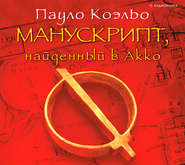По всем вопросам обращайтесь на: info@litportal.ru
(©) 2003-2024.
✖
The Fifth Mountain
Автор
Год написания книги
2019
Настройки чтения
Размер шрифта
Высота строк
Поля
“I’m going with you. I weary of fighting for a few more hours of life.”
He rose and opened the stable door, allowing the sun to enter and expose the two men hiding there.
THE LEVITE took him by the arm, and they began to walk. If not for one then another scream, it would have seemed a normal day in a city like any other—a sun that barely tingled the skin, the breeze coming from a distant ocean to moderate the temperature, the dusty streets, the houses built of a mixture of clay and straw.
“Our souls are prisoners of the terror of death, and the day is beautiful,” said the Levite. “Many times before, when I felt at peace with God and the world, the temperature was horrible, the desert wind filled my eyes with sand and did not permit me to see a hand’s span before me. Not always does His plan agree with what we are or what we feel, but be assured that He has a reason for all of this.”
“I admire your faith.”
The Levite looked at the sky, as if reflecting briefly. Then he turned to Elijah. “Do not admire, and do not believe so much; it was a wager I made with myself. I wagered that God exists.”
“You’re a prophet,” answered Elijah. “You too hear voices and know that there is a world beyond this world.”
“It could be my imagination.”
“You have seen God’s signs,” Elijah insisted, beginning to feel anxiety at his companion’s words.
“It could be my imagination,” was again the answer. “In actuality, the only concrete thing I have is my wager: I have told myself that everything comes from the Most High.”
THE STREET was deserted. Inside their houses, the people waited for Ahab’s soldiers to complete the task that the foreign princess had demanded: executing the prophets of Israel. Elijah walked beside the Levite, feeling that behind each door and window was someone watching him—and blaming him for what had happened.
“I did not ask to be a prophet. Perhaps everything is merely the fruit of my own imagination,” thought Elijah.
But, after what had occurred in the carpenter’s shop, he knew it was not.
SINCE CHILDHOOD, he had heard voices and spoken with angels. This was when he had been impelled by his father and mother to seek out a priest of Israel who, after asking many questions, identified Elijah as a nabi, a prophet, a “man of the spirit,” one who “exalts himself with the word of God.”
After speaking with him for many hours, the priest told his father and mother that whatever the boy might utter should be regarded as earnest.
When they left that place, his father and mother demanded that Elijah never tell anyone what he saw and heard; to be a prophet meant having ties to the government, and that was always dangerous.
In any case, Elijah had never heard anything that might interest priests or kings. He spoke only with his guardian angel and heard only advice about his own life; from time to time he had visions he could not understand—distant seas, mountains populated with strange beings, wheels with wings and eyes. As soon as the visions disappeared, he—obedient to his father and mother—made every effort to forget them as rapidly as possible.
For this reason, the voices and visions became more and more infrequent. His father and mother were pleased, and they did not raise the matter again. When he came of an age to sustain himself, they lent him money to open a small carpentry shop.
NOW AND AGAIN, he would gaze respectfully upon the other prophets, who walked the streets of Gilead wearing their customary cloaks of skins and sashes of leather and saying that the Lord had singled them out to guide the Chosen People. Truly, such was not his destiny; never would he be capable of evoking a trance through dancing or self-flagellation, a common practice among those “exalted by the voice of God,” because he was afraid of pain. Nor would he ever walk the streets of Gilead, proudly displaying the scars from injuries achieved during a state of ecstasy, for he was too shy.
Elijah considered himself a common man, one who dressed like the rest and who tortured only his soul, with the same fears and temptations of simple mortals. As his work in the carpentry shop went on, the voices ceased completely, for adults and workers have no time for such things. His father and mother were happy with their son, and life proceeded in harmony and peace.
The conversation with the priest, when he was still a child, came to be merely a remote memory. Elijah could not believe that Almighty God must talk with men to have His orders obeyed; what had happened in his childhood was only the fantasy of a boy with nothing to do. In Gilead, his native city, there were those thought by the inhabitants to be mad. They were unable to speak coherently and incapable of distinguishing the voice of the Lord from the delirium of insanity. They spent their lives in the streets, preaching the end of the world and living on the charity of others. Even so, none of the priests considered them “exalted by the voice of God.”
Elijah concluded in the end that the priests would never be sure of what they were saying. The “exalted of God” were a consequence of a country uncertain of its way, where brother fought brother, where new governments appeared with regularity. Prophets and madmen were one and the same.
When he learned of his king’s marriage to Jezebel, princess of Tyre, he had thought it of little significance. Other kings of Israel had done the same, and the result had been a lasting peace in the region and an ever more important trade with Lebanon. Elijah scarcely cared if the people of the neighboring country believed in gods that did not exist or dedicated themselves to strange religious practices such as worshiping animals and mountains; they were honest in their negotiations, and that was what mattered most.
Elijah went on buying the cedar they brought in and selling the products of his carpentry shop. Though they were somewhat haughty and liked to call themselves “Phoenicians” because of the different color of their skin, none of the merchants from Lebanon had ever tried to take advantage of the confusion that reigned in Israel. They paid a fair price for the merchandise and made no comment about the constant internal wars or the political problems facing the Israelites.
AFTER ASCENDING to the throne, Jezebel had asked Ahab to replace the worship of the Lord with that of the gods of Lebanon.
That too had happened before. Elijah, though outraged at Ahab’s compliance, continued to worship the God of Israel and to observe the laws of Moses. “It will pass,” he thought. “Jezebel seduced Ahab, but she will not succeed in convincing the people.”
But Jezebel was a woman unlike others; she believed that Baal had brought her into the world to convert peoples and nations. Astutely and patiently, she began rewarding those who deserted the Lord and accepted the new deities. Ahab ordered a temple built for Baal in Samaria and in it raised an altar. Pilgrimages began, and the worship of the gods of Lebanon spread to all parts.
“It will pass. It may take a generation, but it will pass,” Elijah went on thinking.
THEN SOMETHING he was not expecting took place. One afternoon, as he was finishing a table in his shop, everything around him grew dark and thousands of tiny lights began twinkling about him. His head began to ache as never before; he tried to sit but could not move a muscle.
It was not his imagination.
“I’m dying,” he thought at that instant. “And now I’ll discover where God sends us after death: to the heart of the firmament.”
One of the lights shone more brightly, and suddenly, as if coming from everywhere at once:
“And the word of the Lord came unto him, saying: Tell Ahab, that as surely as the Lord God of Israel liveth, before whom thou standest, there shall not be dew nor rain these years, but according to My word.”
The next moment, all returned to normal: the carpentry shop, the afternoon light, the voices of children playing in the street.
ELIJAH DID NOT SLEEP that night. For the first time in many years, the sensations of his childhood came back to him; and it was not his guardian angel speaking but “something” larger and more powerful than he. He feared that if he failed to carry out the order he might be cursed in his trade.
By morning, he had decided to do as he had been asked. After all, he was only the messenger of something that did not concern him; once the task was done, the voices would not return to trouble him.
It was not difficult to arrange a meeting with King Ahab. Many generations before, with the ascension of King Samuel to the throne, the prophets had gained importance in commerce and in government. They could marry, have children, but they must always be at the Lord’s disposal so that the rulers would never stray from the correct path. Tradition held that thanks to these “exalted of God” many battles had been won, and that Israel survived because its rulers, when they did stray from the path of righteousness, always had a prophet to lead them back to the way of the Lord.
Arriving at the palace, he told the king that a drought would assail the region until worship of the Phoenician gods was forsaken.
The sovereign gave little importance to his words, but Jezebel—who was at Ahab’s side and listened attentively to what Elijah was saying—began to ask a series of questions about the message. Elijah told her of the vision, of the pain in his head, of the sensation that time had stopped as he listened to the angel. As he described what had happened, he was able to observe closely the princess of whom all were talking; she was one of the most beautiful women he had ever seen, with long, dark hair falling to the waist of a perfectly contoured body. Her green eyes, which shone in her dark face, remained fixed on Elijah’s; he was unable to decipher what they meant, nor could he know the impact his words were causing.
He left convinced that he had carried out his mission and could go back to his work in the carpentry shop. On his way, he desired Jezebel, with all the ardor of his twenty-three years. And he asked God whether in the future he could find a woman from Lebanon, for they were beautiful with their dark skin and green eyes full of mystery.
HE WORKED for the rest of the day and slept peacefully. The next morning he was awakened before dawn by the Levite; Jezebel had convinced the king that the prophets were a menace to the growth and expansion of Israel. Ahab’s soldiers had orders to execute all who refused to abandon the sacred task that God had conferred upon them.
To Elijah alone, however, no right of choice had been given: he was to be killed.
He and the Levite spent two days hidden in the stable south of Gilead while 450 nabi were summarily executed. But most of the prophets, who roamed the streets flagellating themselves and preaching the end of the world for its corruption and lack of faith, had accepted conversion to the new religion.
A SHARP SOUND, followed by a scream, broke into Elijah’s thoughts. He turned in alarm to his companion.
“What was that?”
There was no answer; the Levite’s body fell to the ground, an arrow piercing his chest.
Standing before him, a soldier fitted another arrow into his bow. Elijah looked about him: the street with doors and windows tightly shut, the sun shining in the heavens, a breeze coming from an ocean of which he had heard so much but had never seen. He thought of running, but he knew he would be overtaken before he reached the next corner.
“If I must die, let it not be from behind,” he thought.
The soldier again raised his bow. To Elijah’s surprise, he felt neither fear nor the instinct to survive, nor anything else; it was as if everything had been determined long ago, and the two of them—he and the soldier—were merely playing roles in a drama not of their own writing. He remembered his childhood, the mornings and afternoons in Gilead, the unfinished work he would leave in his carpentry shop. He thought of his mother and father, who had never desired their son to be a prophet. He thought of Jezebel’s eyes and of King Ahab’s smile.
He thought how stupid it was to die at twenty-three, without ever having known a woman’s love.

















